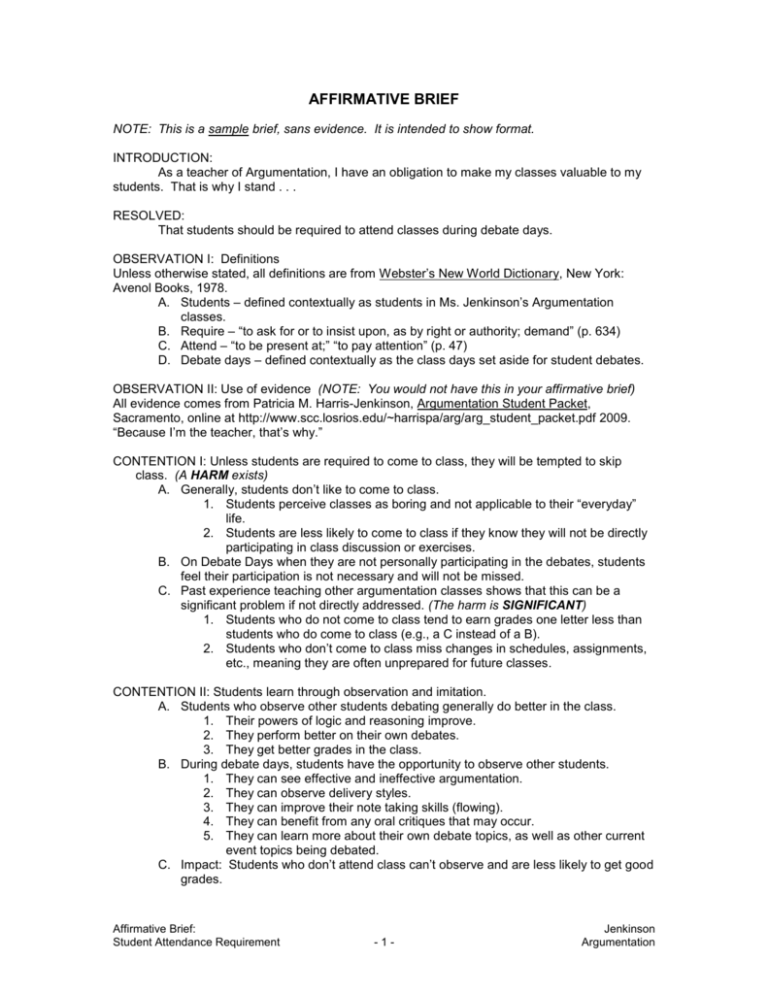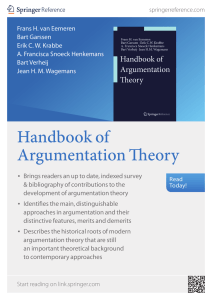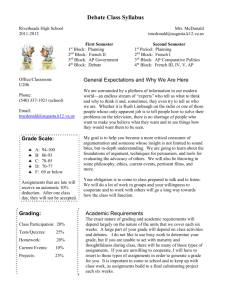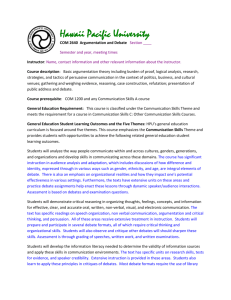Attendance Affirmative Brief
advertisement

AFFIRMATIVE BRIEF NOTE: This is a sample brief, sans evidence. It is intended to show format. INTRODUCTION: As a teacher of Argumentation, I have an obligation to make my classes valuable to my students. That is why I stand . . . RESOLVED: That students should be required to attend classes during debate days. OBSERVATION I: Definitions Unless otherwise stated, all definitions are from Webster’s New World Dictionary, New York: Avenol Books, 1978. A. Students – defined contextually as students in Ms. Jenkinson’s Argumentation classes. B. Require – “to ask for or to insist upon, as by right or authority; demand” (p. 634) C. Attend – “to be present at;” “to pay attention” (p. 47) D. Debate days – defined contextually as the class days set aside for student debates. OBSERVATION II: Use of evidence (NOTE: You would not have this in your affirmative brief) All evidence comes from Patricia M. Harris-Jenkinson, Argumentation Student Packet, Sacramento, online at http://www.scc.losrios.edu/~harrispa/arg/arg_student_packet.pdf 2009. “Because I’m the teacher, that’s why.” CONTENTION I: Unless students are required to come to class, they will be tempted to skip class. (A HARM exists) A. Generally, students don’t like to come to class. 1. Students perceive classes as boring and not applicable to their “everyday” life. 2. Students are less likely to come to class if they know they will not be directly participating in class discussion or exercises. B. On Debate Days when they are not personally participating in the debates, students feel their participation is not necessary and will not be missed. C. Past experience teaching other argumentation classes shows that this can be a significant problem if not directly addressed. (The harm is SIGNIFICANT) 1. Students who do not come to class tend to earn grades one letter less than students who do come to class (e.g., a C instead of a B). 2. Students who don’t come to class miss changes in schedules, assignments, etc., meaning they are often unprepared for future classes. CONTENTION II: Students learn through observation and imitation. A. Students who observe other students debating generally do better in the class. 1. Their powers of logic and reasoning improve. 2. They perform better on their own debates. 3. They get better grades in the class. B. During debate days, students have the opportunity to observe other students. 1. They can see effective and ineffective argumentation. 2. They can observe delivery styles. 3. They can improve their note taking skills (flowing). 4. They can benefit from any oral critiques that may occur. 5. They can learn more about their own debate topics, as well as other current event topics being debated. C. Impact: Students who don’t attend class can’t observe and are less likely to get good grades. Affirmative Brief: Student Attendance Requirement -1- Jenkinson Argumentation CONTENTION III: The existing syllabus for the class does not adequately address attendance on Debate Days. (The harm is INHERENT in the status quo) A. The syllabus identifies an attendance requirement, but does not specify what attendance actually means. B. Students may be tempted to come to class “tardy” and feel they have met the attendance requirement. C. Students may feel that “attendance” merely refers to the “being present” definition, and not the “pay attention” definition. Thus, I propose the following 4-plank PLAN to address the appalling problem of non-attendance on Debate Days. PLANK I: Agency This plan will be administered by the instructor. PLANK II: Mandates A. Students will be in class prior to the start of the first debate. 1. The attendance sheet will be passed out before the debate starts and will no longer be available once the debate begins. 2. Students arriving late may petition the instructor after class for leniency. B. Students will be actively observing the debates in progress. 1. Students should practice flowing debates. 2. Students should not engage in the following activities. a. Sleeping. b. Studying for other classes. c. Social conversation with other students. PLANK III: Enforcement A. Any student observed not attending (sleeping, etc.) will be kicked out of class and counted as “absent” for the day. B. These absences will be counted towards the attendance requirement for the class. C. Two violations will result in an automatic one letter grade drop. PLANK IV: Funding and Staffing A. No additional funding will be required to pay for this plan. B. The instructor will identify “policing students” at the beginning of class to monitor compliance with the mandates identified. Adoption of this plan will result in the following ADVANTAGES: I. By being in class and actively listening, students will increase the likelihood that they will earn a good grade in the class. A. Students will perform better on their own debates. B. Students will improve their reasoning, logic, and use of evidence. II. Students will learn skills and information that will benefit them in other classes. A. Students can apply the skills learned in Argumentation in other classes. B. Students will learn more about the world around them. NOTE: In a real affirmative brief (like the ones you are required to do for class), you would have evidence under each point. For now, attribute most of the evidence to Mrs. Jenkinson: “Because I said so.” Affirmative Brief: Student Attendance Requirement -2- Jenkinson Argumentation





